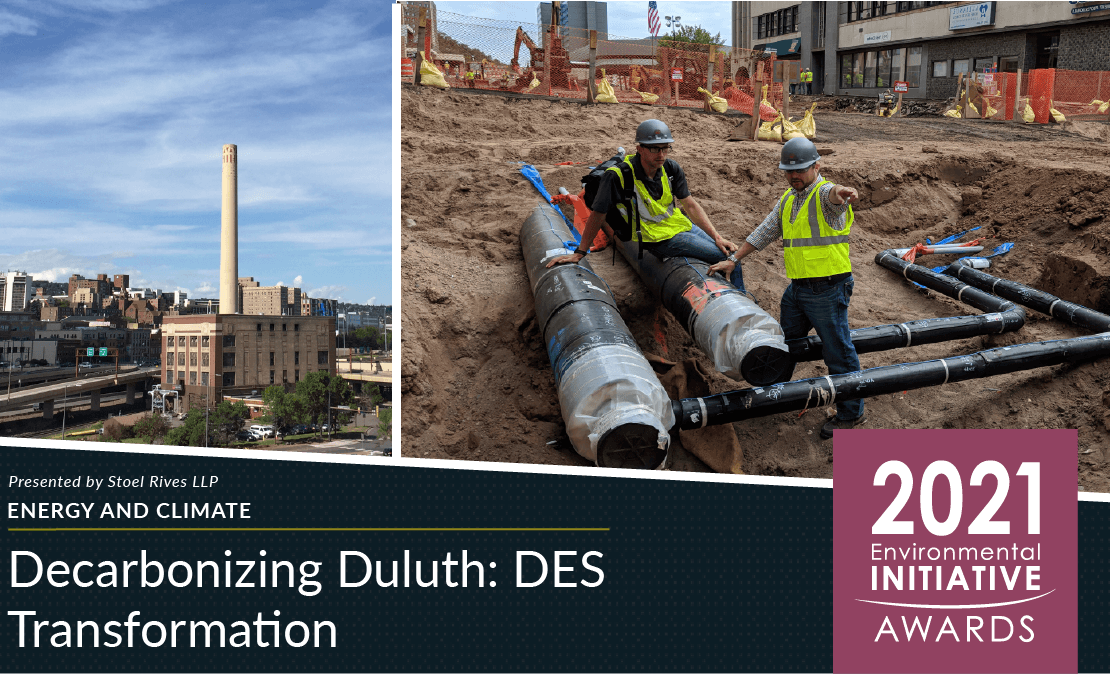Talking climate action and district energy with the City of Duluth and Ever-Green Energy

Three years ago, Ever-Green Energy and the City of Duluth began transforming a major portion of the city’s energy system, replacing 16 blocks of aged steam pipe in its district energy system with new hot water infrastructure. The project, which won a 2021 Environmental Initiative Award, has achieved significant emission reductions, with a nearly 80% reduction in coal usage.
I recently met with Mindy Granley, Sustainability Officer with the City of Duluth and Jenae Batt, Marketing and Communications Manager at Ever-Green Energy to get an update on the project and their work together. Here is what I learned.
The City of Duluth is committed to meeting standards set through the Paris Agreement, which means that by 2050, the city plans to make an 80% reduction in Greenhouse Gas (GHG) emissions, based on 2008 levels.
What role does Duluth’s district energy system play in meeting these goals?
The Paris Agreement goal is really a municipal goal for city-owned properties. Duluth Energy Systems (DES) is owned by the city, and we sell heat to buildings downtown. In this system, any wasted heat that isn’t sold counts against our carbon footprint. The new system, and its switch from steam to hot water, is more efficient, which helps with our greenhouse gas reduction goals.
Duluth’s district energy system is heating about 160 buildings downtown. Anything we do to make it more efficient, or to integrate renewables, or eliminate coal, all of those choices will reduce emissions in 160 buildings, not just one. The upgrades made to the system provide us with many options to keep making improvements. It’s also why we’re fortunate to have Ever-Green Energy as a partner and operator of our system. They have the expertise to be able to point us in the right direction as we consider new technologies and changes to the system.
Shortly after receiving the award, the Duluth City Council passed a Climate Emergency Declaration (21-0256R), which calls for us to exceed the goal to reduce emissions 80% by 2050. The declaration also broadened the carbon reduction mandate to the entire community, not just municipal emissions. It’s a big challenge, but also really motivating.
I would love to hear what is in the future for the district system? Further coal reductions? System expansion? Waste heat capture?
Any of those are possibilities. Now that the new system is functioning, it makes all of those technologies and improvements – from solar hot water to waste heat recovery – possible. This year we agreed operationally that coal will only be used in emergency situations, like during an outage. This policy and practice paves the way for us to eventually eliminate coal. In fact, our Climate Action Plan prescribes the elimination of coal within five years and we think we might be able to make the change sooner. We’re excited about that.
What can other cities learn from Duluth regarding decarbonizing a district heating system?
It’s certainly a commitment. It’s not a small financial investment the City of Duluth made. This project, even though it was an expensive one, also reset the life span of a major asset in town. You have to think long term about it so that you don’t get discouraged by the price tag. That longer view is important. You can, if you’re thoughtful, transform 100-year-old systems to meet the needs of today. That in and of itself is a great sustainability story.
Large projects like this succeed because of dedicated and passionate champions. For cities that are thinking about updating their district energy system, make sure you have staff that are passionate and persistent. And, bring in a great partner that knows the engineering and understands energy markets.
Is there anything else you would like to share?
The Duluth Energy Systems story is a great one, but it’s just one piece of the city’s larger climate strategy. Right now, we’re in the middle of developing Duluth’s first-ever Climate Action Plan. The plan will identify strategies to reduce greenhouse gas emissions and improve climate resiliency and adaptation, while focusing on the needs of vulnerable communities. It builds on work already underway to improve energy efficiency in our buildings and fleets, respond to stormwater runoff management issues, and integrate renewables. The plan will help us prioritize our actions as we keep working mitigate and adapt to our changing climate.
Would you encourage other organizations to apply for an Environmental Initiative Award? If so, why?
Yes! The Environmental Initiative Awards are a great way to celebrate your successes. We really enjoyed getting to meet the other winners and the ceremony was fun. There is something powerful about being able to tell your story and share it with others. It’s also a chance to honor and celebrate the people you’re working with to make your project happen. We hope our project inspires others and are here as a resource for other cities or campuses that are considering making a change like we did.
Nominations for the 2022 Environmental Initiative Awards will open on Wednesday, Jan. 19, 2022. The Environmental Initiative Awards recognizes those working in partnership at the nexus of a healthy environment, a prosperous economy, and an equitable society.